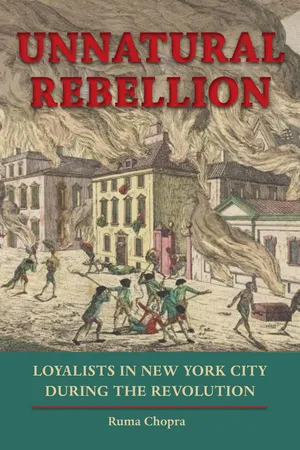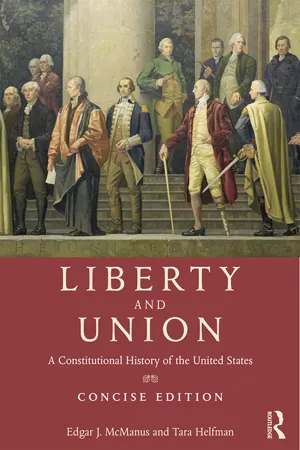History
Intolerable Acts
The Intolerable Acts were a series of punitive measures imposed by the British Parliament on the American colonies in 1774 in response to the Boston Tea Party. The acts included the closure of the port of Boston, the restriction of town meetings, and the quartering of British troops in private homes. These measures further fueled the growing tensions between the colonies and Britain, ultimately leading to the American Revolutionary War.
Written by Perlego with AI-assistance
Related key terms
2 Key excerpts on "Intolerable Acts"
- eBook - ePub
Unnatural Rebellion
Loyalists in New York City during the Revolution
- Ruma Chopra(Author)
- 2011(Publication Date)
- University of Virginia Press(Publisher)
Although reluctant to offer submission to British policies, many New Yorkers were hesitant to move toward aggressive resistance. Some with mercantile interests who would reject rebellion had closer connections to empire, and better informed of British policies, they felt more confident about an American future within its protective realm. Their attraction to the ideal of empire permitted them to see British efforts at taxation as disturbing infringements, not as enslavement.The Boston Tea Party in 1773 led to British retaliation in the form of the Coercive Acts in 1774. The battles of Lexington and Concord followed in 1775. The latter created a sense of urgency and forced a crise de conscience for New Yorkers. Between 1774 and 1776, many gradually realized that they faced a growing and irreconcilable conflict between imperial sovereignty and colonial aspirations for greater autonomy.The passage of the Coercive Acts, or Intolerable Acts, as they came to be know in America, temporarily united most New Yorkers. Passed in retaliation for Boston residents’ dumping the East India Company’s tea into Boston Harbor in December 1773, the acts closed the port of Boston and provided for the billeting of troops within Boston. These measures alienated an overwhelming majority of colonists and thus provided the broadest possible base on which an opposition could be erected. Designed to punish and humble the city of Boston, they aroused fears that a similar fate awaited New York City. In May 1774, New York Councillor William Smith Jr. worried that these policies would cause colonists to “lose all the Attachmt. we once had to so great a Degree for the Parent Country.”1Moderate leaders in the colonies worried about the escalation of the conflict caused by Britain’s hard stance against Boston. Like the radicals, they considered the British government’s reaction to the Boston Tea Party excessive and unjustified. They were also concerned about the brittle and uncompromising tone that had crept into the imperial debate. In February 1774, Pennsylvania assemblyman Joseph Galloway, a longtime protégé of Benjamin Franklin, expressed his anxiety about the future of the colonies if cast outside the unifying influence of the empire. Galloway worried that the various colonies acted as independent communities that shared nothing in common. They had “different forms of government, productions of soil, and views of commerce; different religions, tempers, and private interests.” Their only hope of mutual harmony and stability lay within the empire.2 - eBook - ePub
Liberty and Union
A Constitutional History of the United States, concise edition
- Edgar J. McManus, Tara Helfman(Authors)
- 2014(Publication Date)
- Routledge(Publisher)
Conservatives and radicals joined forces to keep the company tea out of the colonies. This was essential both to prevent the duty from being paid and to protect consumers from the temptation to buy cheap tea. A mass meeting in Philadelphia forced the company’s consignee to resign, and mob threats produced the same results in Charleston and New York City. Mobs also forced the tea ships to leave Philadelphia and New York City and return to England without unloading. The radicals prevailed everywhere except Boston, where the company’s consignees fled to Castle William in the harbor and refused to resign. Moreover, Governor Thomas Hutchinson took a hard line and refused to allow the tea to be sent back to England until the duty had been paid. The Sons of Liberty also took a hard line. Between fifty and sixty of them forcibly boarded the tea ships and dumped their cargoes into Boston harbor. The incident put an end to conciliation and polarized relations between Britain and the colonies.Figure II.4 Mezzotint titled A New Method of Macarony Making, as Practised at Boston (1774). This print depicts two men, one identifiable as a Son of Liberty by the bow in his hat, tarring and feathering a British customs officer. The eighteenth-century epithet “macaroni” referred to a man who dressed in an ostentatious or flamboyant manner.Library of Congress, Prints and Photographs Division, LC-USZ62-45386The Intolerable Acts
The Boston Tea Party brought harsh reprisals from Britain. Parliament was shocked by how far British authority had eroded in the colonies. Mobs controlled the major cities, and orderly processes of government had broken down. Unless the lawless elements were suppressed and order restored, the colonies might spin out of control completely. So during the spring and summer of 1774 parliament passed the Coercive Acts, a series of repressive measures that Americans dubbed the Intolerable Acts. One, the Boston Port Act, punished the entire city for the destruction of the tea. Boston was closed to commerce until the East India Company was compensated for its loss. Another, the Administration of Justice Act, provided that British officials charged with capital crimes in the course of suppressing riots or enforcing the trade laws should be sent to England for trial if the governor thought a fair trial could not be held in Massachusetts. A third measure, the Massachusetts Government Act, completely reorganized the provincial government. The governor was granted additional powers, and the authority of the assembly was sharply reduced. No public meetings could be held without the governor’s consent, and even then they had to stay within the approved agenda.
Learn about this page
Index pages curate the most relevant extracts from our library of academic textbooks. They’ve been created using an in-house natural language model (NLM), each adding context and meaning to key research topics.

